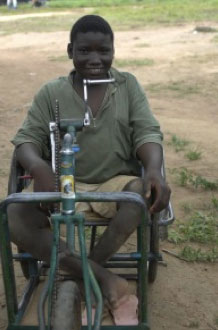Your progress
0%
complete

There are no jobs that are “best suited” to people with disabilities. Each job seeker with a disability is an individual with his or her own interests, goals, skills, abilities and education levels. These individual factors – along with the demands of the labour market and available support – are key to consider wen helping people with disabilities find suitable wage employment.
Whichever type of work an individual decides is best suited for him or her, the key to finding an appropriate position is obtaining a suitable education.
Learn how a young woman with spina bifada used her education to become a lawyer before the Supreme Court of the Philippines.


Irene was born on Palawan Island, Philippines, in 1980. She was born with spina bifida, which caused severe mobility impairment. Every year, she and her mother had to make the long and expensive trip to Manila to get a special back brace fitted or changed.
When the Bahatala CBR project began in Palawan, it opened its own prosthetic/orthotic workshop. This made the long and frequent visits to Manila unnecessary. The CBR provided moral support and advised on the development and expansion of the small grocery store run by Irene’s family to raise their income level. This helped Irene to finish schooling with good records, which helped her to secure a scholarship to university.
Irene graduated with an honours degree in political science and then studied law. In 2006, she graduated from law school with great distinction and gained another scholarship, which enabled her to pass the bar examinations. Irene now works as a lawyer in the Supreme Court of the Philippines – like any other lawyer in the court.